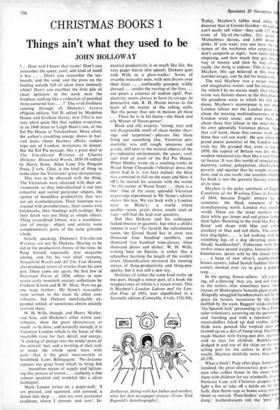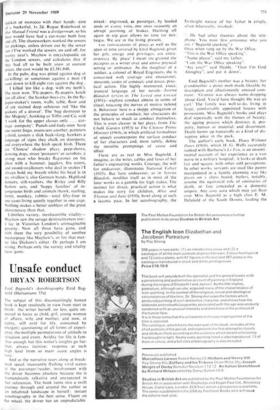CHRISTMAS BOOKS 1 Things ain't what they used to be
JOHN HOLLOWAY
How well I know that room! Don't you remember the queer, cool, odd kind of smell it has . . . Don't you remember the tea- boards, and the sand, and the press on the landing outside full of clean linen intensely white? Don't you recollect the little pile of clean spittoons in the nook near the fireplace, looking like a collection of petrified three-cornered hats ... ?' The vivid liveliness running through all Dickens's Letters (Pilgrim edition, Vol II; edited by Madeline House and Graham Storey, our 135s) is not very often quite like that sudden evocation, in an 1840 letter to Leigh Hunt's son, of the Eel Pie House at Twickenham. More often, the author's crackling energy shows in hur- ried notes about business affairs, sudden trips out of London, invitations to dinner. But the Eel Pie passage, like a great deal in The Uncollected Writings of Charles Dickens: Household Words, 1850-59 (edited by Harry Stone. Allen Lane The Penguin Press, 2 vols, 126s), is the kind of thing to make clear the Victorians' great idiosyncrasy.
This was to be obsessed with the thing. The Victorians were obsessed with their en- vironment, as they individualised it out into colourful and varied particular objects, the upshot of boundless productivity that was not yet standardisation. Their furniture was crusted with protuberances, their rooms with knicknacks, their bindings with toolings. But their fetish was not thing as simple object. Thing crystallised labour, was a manifesta- tion of energy: object and activity were complementary parts of the same galvanic whole.
Strictly speaking, Dickens's Uncollected Writings are not by Dickens. Sharing as he did in the productivity-frenzy of his time, he flung himself repeatedly into magazine editing, and for his two chief ventures, Household Words and All The Year Round, also produced scores of articles from his own pen. These came out again, the first few in Reprinted Pieces of 1858, others in now scarce early twentieth century collections by Frederic Kitton and B. W. Matz. Now we go one stage further: Mr Stone's trouvailles were written in the main by other con- tributors, but Dickens indefatigably ex- panded, edited, or sometimes almost entirely rewrote them.
W. H. Wills, though, and Henry Morley, and Sala, and Dickens's other minor con- tributors, show the great idiosyncrasy as much as he does; and naturally enough, it is Victorian London which is the focus of this insatiable taste for fact, detail, and energy. `A sticking of prongs into the tender parts of the animals' feet, and a twisting of their tails to make the whole spine teem with pain'—that is the great meat-market at Smithfield. Later, Billingsgate: `No distance appears too great from which to bring fish . . . boundless means of supply and lighten- ing-like powers of transit , suddenly a fine salmon sparkled and twinkled like a silver harlequin'.
Mark Lemon writes on a paper-mill: 'I am pressed, and squeezed, and jammed, a dozen feet deep . . . into my own particular cauldron; where I simmer, and stew'. In-
dustrial productivity is so much like life, the very paper bursts into speech. Dickens goes with Wills to a glass-works: 'knots of swarthy muscular men, with nets drawn over their faces . . . confusedly grouped, wildly dressed ... amidst the roaring of the fires ... out pours a cataract of molten opal'. Pro- ductivity seems always to have its savage, its destructive side. R. H. Home moves to the heart of the matter at the rolling mills. 'But the power that sets in motion all these . . . There he is in his house—the black and oily Master of Steam-power'.
Black and oily majesty, 'strong, racy and not disagreeable smell of clean timber shav- ings and turpentine'—phrases like these bring out something else. Victorian pro- ductivity was still rough, sensuous and grainy, still near to the natural objects of the pre-industrial environment, the queer, cool, odd kind of smell of the Eel Pie House. When Morley wrote on a smelting-works in Wood Street Cheapside (`whatever dross the silver had in it, was here melted; the blast was contrived to fall on the scum and blow it off'), he started his account with the words `At the corner of Wood Street . . . there is a tree'. One of the many splendid Victorian engravings reproduced in Mr Stone's edition shows this tree. We are back with a London near to Blake's: a world where quality—scum, grain, dross, smells cool or racy—still had the lead over quantity.
Not that Dickens and his colleagues lacked interest in quantity, but what a child's interest it was! To furnish the refreshment room, the Grand Stand has in store two thousand four hundred tumblers, one thousand two hundred wine-glasses, three thousand plates and dishes'. W. H. Wills, writing here on Epsom, is rather like a schoolboy learning the length of the world's rivers. Quantification mirrored the teeming arrays of thing-productivity and thing-pro- sperity, but it was still a new toy.
Statistics of rather the same kind make up one part, though a minor part, of a book the reappearance of which is a major event. This is Mayhew's London Labour and the Lon- don Poor of 1851, now republished in a facsimile edition (Constable, 4 vols, 132s 6d).
Authoress, sitting with her father and mother, after her first newspaper review—From 'End Bagnold's Autobiography'.
Today, Mayhew's tables read oddly. discover that at Covent Garden—though 0 can't easily tell when—they sold 152 doz roots of lily-of-the-valley, 216 dozen Michaelmas daisies, and 1,600 dozen pinks. If you want, you can have the ve names of the workmen who emptied Lo don's cesspools at night: how many did t emptying, and how much they got, first way of money and then by way of—b really, the thing is tedious. This is the oth Mayhew. His age believed in this form number-Magic, and he did his homework.
The real Mayhew was a major creati and imaginative writer; and his imaginati (by which 1 by no means imply that what wrote was fiction) shows in the first place the grandiose error to which his title co duces. Mayhew's masterpiece is not abo London labour nor the London poor, it about the teeming multitudinousness of t London street scene; and even then, n about those that labour in the street but, i his own splendidly Victorian phrase, 'tho that will work, those that cannot work, a those that will not work'. He saw where t grand poetic potential of the London sce truly lay. He grasped that, even as late 1850, the capital of Britain was less like modern industrial city than like a vast One tal bazaar. It was this world of mingled pr ductivity, colour, polyglotism, charlatanis poverty and squalor that he sought to co pass; and as one reads, one wonders wheth ,.his book is not the greatest literary triump of its time.
Mayhew is the polar antithesis of Engel Condition of the Working Class in Englat of 1844, because Engels' interest lay sameness: the black sameness of th manufacturing north. London was anoth world. There are the street markets wi their white gas lamps and red grease lam their lights 'fluttering in the wind like flags flame' and shops with blue and yello crockery or blue and red shirts. The coste love dog-fights . . . 'a lad walking with th trembling legs of a dog shivering under bloody handkerchief'. Fishermen with thei twelve ounce pound weights, forestallers a bummarees, sprats sold by the chuck ('loo . . a heap of new silver'), scuttle-mou Sussex oysters, faked Scotch haddies that th costers smoked over ivy to give a peppe tang....
In the spring, flower-sellers: 'all a-grow ing, all a-blowing' they cry, and sell viole to the tailors, who sometimes have `sma statues of Shakespeare beneath glass shades Allegedly smuggled handkerchiefs sell by th piece (in threes), watercress by the han shellfish by the wash. Beggars' tricks includ `the Spanish lurk' (pretending to be a Pain sular volunteer), screeving on the pavement and 'standing pad with a fakement'. Th music-duffers faked up dud violins, duff birds were painted like tropical ones a livened up on a diet of hemp-seed, blackbir made blacker with frying-pan dirt, sparrow sold as toys for children. Bumboat-me dodged in and out of the ships on the riv selling purl for the sailors to drink. An nually, Mayhew dutifully notes, they nett £8,190. What a book! Page after page, hundred b hundred, the great idiosyncrasy goes on. 0 men who collect bones in the street barte them with children for toy windmills, Jews Petticoat Lane call Christian paupers in t light a fire or take off a kettle on the Sa bath, then throw rags or bones away into street as reward. Pure-finders' collect dog dung: leatherdressers rub the 'pure in
kidskin or morocco with their hands—cost of a bucketful, Is 2d. Rogue Riderhood in Our Mutual Friend was a dredgerman, so his boat would have had a cut-water both fore and aft. The shoreworkers worked the sewers for pickings, unless driven out by the sewer rats ('I've worked the sewers. on and off, for twenty year'). Mayhew is encyclopaedic on the London sewers, and calculates that if they had all to be built anew at current prices, the cost would be £3.381.840.
In the pubs, dog was pitted against dog at rat-killing; or sometimes against a man VI cent down to kill eight rats aeainst the dog . .. I killed 'em like a dog, with my teeth'). The man won. 'Fly-papers, fly-papers, ketch 'em all alive', the hawker-boys cry. In the fly- paper-maker's room, walls, table, floor and all are stained deep ochreous red 'like the pockets of a drover'. The 'bug destroyer to Her Majesty', hawking as Tiffin and Co, said 'I work for the upper classes only . . . car- riage company'. Punch-and-Judy-men have one secret lingo, mummers another, patterers a third, costers a slick back-slang. hawkers a language of signs they chalk on doorposts, and everywhere the Irish speak Irish. There are 'Chinese' shadow plays. peep-shows, dancing dogs, street 'posturers* or acrobats, a strong man who breaks flagstones on his chest with a hammer, jugglers, fire eaters, and sword-swallowers who deal in snakes CI always hold my breath whilst his head is in my swallow'); also German bands. Highland dancers, stilt-vaulters, the Risley and Billy Barlow acts, and `happy families' of in- congruous birds and animals (hawk, starling, ferret, monkey, rabbits—total fifty-four in one case) living quietly together in one cage. Nothing makes a better emblem of the great idiosyncrasy than that.
Limitless variety, inexhaustible vitality— Mayhew saw the savage destructiveness too: it lay in Victorian London's unimaginable poverty. Now all three have gone, and with them the very possibility of another masterpiece like Mayhew's, or for that mat- ter like Dickens's either. Or perhaps I am wrong. Perhaps only the variety and vitality have gone.











































 Previous page
Previous page